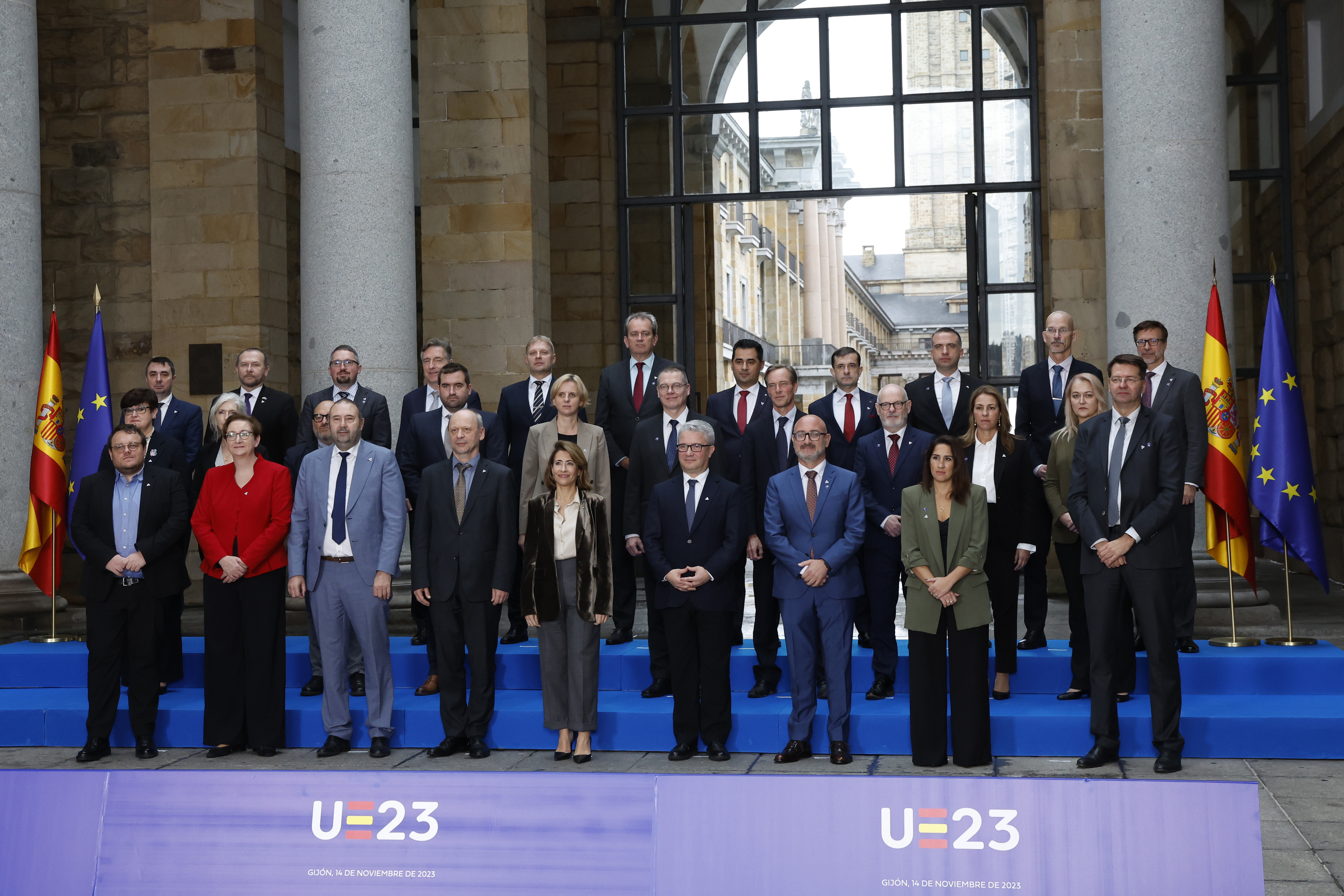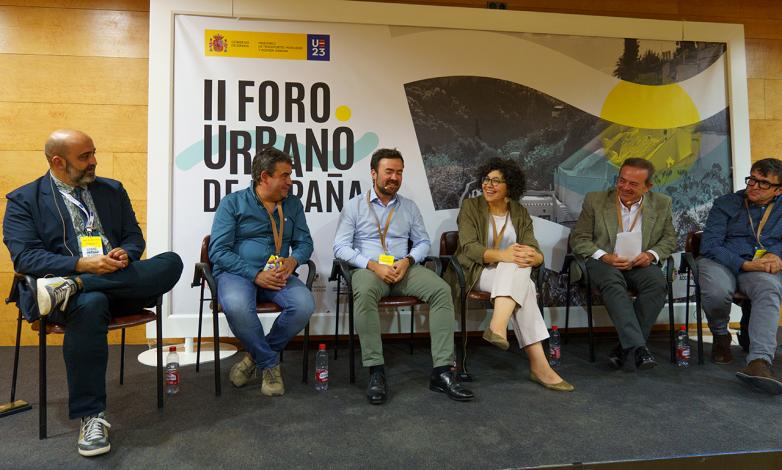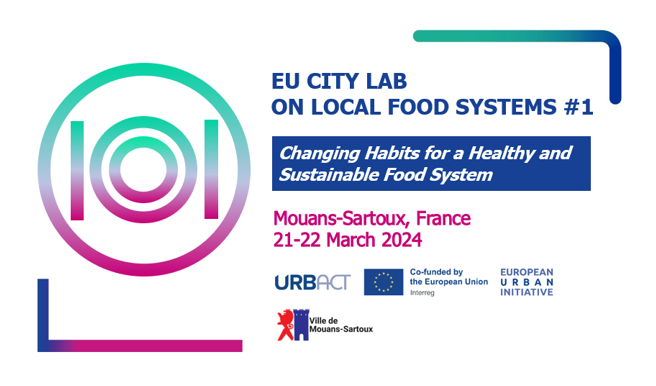The last few years have been defined by transition, planned or not, and 2024 will be no different. Voting in June and November will welcome a new European Parliament and European Commission, which, in turn, will influence proceedings for the EU’s Cohesion Policy post 2027.
Looking ahead to a new EU policy cycle, it is worth zooming in on the Council Presidency of the European Union. Every six months, a Member State oversees the Council of the EU, the co-legislating body alongside the European Parliament. In December 2023, the Spanish Presidency concluded its term, passing on the torch to the Belgian Presidency, which will run until 30 June 2024.
What are the achievements of the Spanish Presidency in furthering sustainable urban development policy under the Urban Agenda for the EU (UAEU)? What roles will cities and local actors play in building on these achievements under the Belgian Presidency? And how do URBACT cities fit into all this?
Read on for some answers as well as next steps.
State of play: cities & EU urban policy
Before looking at the Spanish and Belgian agendas, let’s orient the discussion around cities in the EU policy landscape. According to the latest statistics a substantial percentage of Europeans live in urban areas, and cities account for around 75% of global emissions. Belgian Minister of Climate, Environment, Sustainable Development and Green Deal Zakia Khattabi attests to the essential role of cities in developing solutions to cross-cutting, interconnected challenges. ‘By implementing policies to improve air quality, support a local economy and sustainable food supply, and strengthen the resilience of their territory in the face of the increasingly violent effects of climate change, cities have the power to inspire change on a larger scale, to ensure a just and sustainable transition for our societies.’
If most citizens live in characteristically urban environments, logically, EU policies cannot overlook the diverse needs and challenges of its cities and towns. Furthermore, these policies need to engage and empower cities to address these challenges locally. Over the years, there has been an accumulated focus on urban issues in Europe and internationally. In 2020, we welcomed the New Leipzig Charter, introduced under the German Presidency of the Council of the EU, and urban issues have appeared prominently in the 2021-2027 EU Cohesion Policy. It is generally accepted that urban policy solutions are interconnected and transversal – just look at the Urban Agenda for the EU, the European Green Deal, the Paris Agreement, UN Sustainable Development Goals, the 2030 Agenda and New Urban Agenda, Habitat III principles.
In this context, let’s turn to the Spanish Presidency of the Council of the EU and its contribution to a common EU legislative framework for sustainable urban development.
The Spanish Presidency: defining next steps of the Urban Agenda for the EU
Running from 1 July to 31 December 2023, the Spanish Presidency set out a programme and priorities for a greener, healthier, more inclusive and competitive Europe. There were many achievements, but this article will focus on the accomplishments in the realm of urban affairs.
Through its meetings, events and initiatives, the Presidency singled out cities and local municipalities as critical actors in furthering the objectives of the Urban Agenda of the EU and the European Green Deal. A milestone came in the form of the Gijón Declaration, which advocates for a collaborative, multi-level governance approach by involving local municipalities, national and EU actors.
The declaration was adopted on 14 November 2023 during an informal ministerial meeting on housing and urban development hosted by the Presidency.

Informal Ministerial Meeting on Housing and Urban Development. Source: EU2023ES.
Ministers pointed out that 8.7% of the EU population pays over 40% of their income on housing. If all households living in market-rate rented accommodation are taken into account, this percentage rises to 20.8%. In response to this, the declaration makes explicit reference to the right to decent, affordable housing as an aspect of sustainable, healthy and inclusive ‘built environments’.
While in Gijon, ministers took part in a specific session on the Urban Agenda of the EU, agreeing on two new topics for UAEU partnerships:
- Water-sensitive city
- Housing decarbonisation, heating and cooling local plans
The call for these new partnerships has not been launched yet, but both topics were identified because they represent hefty challenges to urban development (namely, water scarcity, flood risks, decarbonisation of buildings, etc.). For further insights on the second topic, our article on the last EU City Lab elaborates on energy sharing and energy communities. Ministers proposed other new topics to be considered in the future, including urban sprawl, skills for urban transitions, and more.
It is understandable that the Spanish Presidency would push sustainable urban development during its mandate, given that Spain has its own strategic document on urban planning. Under the Spanish Urban Agenda, local municipalities are encouraged to develop action plans in line with the Urban Agenda for the EU, UN 2030 Agenda and cross-cutting EU initiatives, priorities and themes.
URBACT at the Spanish Urban Forum
The second Spanish Urban Forum was held in Granada from 16-17 October 2023. During the Forum, the National URBACT Point in Spain organised a special workshop for Spanish beneficiaries of the latest call for Action Planning Networks to connect and exchange best practices on the Action Planning process. The session was attended by representatives of 15 municipalities from across the country. The same day as the workshop, the Spanish National URBACT Point also chaired a roundtable session on the URBACT IV programme: a success for Spanish municipalities, which involved contributions from Luis Pedro Arechederra Calderón (Spanish Ministry of Finance) and five municipalities. Participants recognised the potential of focus groups and URBACT tools to support local municipalities developing action plans under Spain’s urban agenda.

Roundtable during the II Urban Forum in Granada. Source: URBACT Spain.
The Belgian Presidency: a place for cities at the (negotiating) table
One month into the Belgian Presidency, we can see a couple throughlines emerging from the EU urban development policy framework set out by the Spanish Presidency. Following in Spain’s footsteps, the Belgian Presidency intends to put cities and local municipalities at the centre of European urban policy for this programming period and beyond 2027. During the Presidency, the Brussels-Capital Region will chair the ‘Environment’ and ‘Urban Policy’ Councils. Antoine de Borman, CEO of perspective.brussels (the regional administration on urban development), weighs in on the anticipated role of cities: ‘From the very beginning, we have developed our Presidency programme with cities and important urban European networks. The result is a programme dedicated to European cities.’
Both Presidencies share thematic priorities for the EU 2024-2029 strategic agenda (e.g. housing, territorial cohesion). It is also worth noting that Belgium plans to advance negotiations on new legislation related to the green transition, including items pushed forward by Spain (i.e. general guidance on the Urban Wastewater Treatment Directive).
A series of high-level and stakeholder meetings have been planned around urban development policy, starting on 24 January with ‘A European urban policy fit for the future’ in Brussels (read on for more on this). Between March and April, there will be the Urban Agenda Thematic Partnerships Group meetings, followed by the Urban Agenda for the EU Lab (24 April), to name a few upcoming meetings.
City mayors sign on with the Belgian Presidency
A key outcome of the the 24 January meeting, mentioned above, was the Brussels Declaration of European Mayors, signed by 41 mayors from 19 European countries. The declaration can still be signed here. Margit Tünnemann, Senior Policy Officer, URBACT Secretariat, present at the meeting, states that: ‘This comes at the right time, at the beginning of the Belgian Presidency, when the debate on the future European policies is gaining momentum’, adding, ‘It sends a strong signal for an ambitious European urban policy that is not only designed for cities, but clearly made together with cities.’
Hitting closer to home
The Belgian Presidency programme has announced that it will foster urban transitions and combat specific challenges – e.g. urban sprawl and density. Two aspects of territorial cohesion will be emphasised: (1) tackling land artificialisation, urban sprawl and soil sealing and (2) review of the 2030 territorial agenda.
The right to affordable, quality and sustainable housing is a critical element of the Brussels Declaration of European Mayors which, according to de Borman, reflects ‘a strong demand from cities to tackle the issues of housing, social inequalities and also cooperation between urban and rural communities.’
Much like the Spanish Urban Agenda and contributions to the Urban Agenda for the EU, the declaration also endorses a coordinated, multi-level approach as essential for a sustainable urban model.
URBACT on the frontlines
There might be an extensive legacy of contributors to European urban policy, some mentioned above. The achievements of the Spanish Presidency, and the priority actions of the Belgian Presidency, serve to push the urban agenda to the next level.
The URBACT programme is on track and will continue to offer cities support to tackle pressing issues through cooperation with each other and European partners. According to Tünnemann, ‘It is good to see that many of the URBACT cities are addressing precisely these burning issues and are working together to develop solutions for better and affordable housing, for a sustainable energy system or for healthy and regional food.’ Starting in March, URBACT, together with the European Urban Initiative, will continue to support current partnerships on different thematic areas with the three EU City Labs on ‘Local Food Systems’.
Over the next months, URBACT will support the Belgian Presidency, bringing URBACT cities’ knowledge and perspectives to the table at the Urban Agenda steering meetings. In June, URBACT will participate in the Urban Development Group (Namur) and the Director-Generals for Urban Matters (Brussels) meetings. The URBACT programme will continue to share knowledge and develop local actions through networks on related topics as well as offer opportunities for cities to join urban agenda partnerships.
What’s next on the agenda? You can visit the URBACT website to stay updated on insights from our thematic experts, networking and partnering opportunities, events and more.



